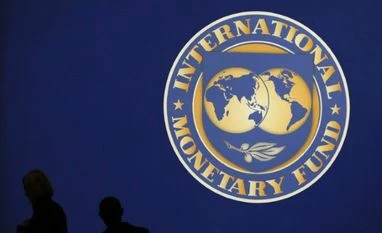The IMF on Tuesday projected a global growth of 3.9 per cent in the next two years due to strong momentum, favourable market sentiment among other factors but warned that any trade disputes threaten to undermine confidence and derail global growth prematurely.
The partial recovery in commodity prices should allow conditions in commodity exporters to gradually improve, the IMF said in its latest World Economic Outlook report.
"Global growth is expected to tick up to 3.9 per cent this year and next, supported by strong momentum, favourable market sentiment, accommodative financial conditions, and the domestic and international repercussions of expansionary fiscal policy in the United States," the International Monetary Fund said.
Observing that the world growth strengthened in 2017 to 3.8 per cent, with a notable rebound in global trade, IMF said it was driven by an investment recovery in advanced economies, continued strong growth in emerging Asia, a notable upswing in emerging Europe, and signs of recovery in several commodity exporters.
Maurice Obstfeld, Economic Counsellor and Director of the Research Department, IMF said that the world economy continues to show broad-based momentum.
"Against that positive backdrop, the prospect of a similarly broad-based conflict over trade presents a jarring picture," he told reporters at a news conference here.
Also Read
The 3.9 per cent global growth forecast for 2018, 2019, he said, is being borne out by continuing strong performance in the euro area, Japan, China, and the US, all of which grew above expectations last year.
"We also project near-term improvements for several other emerging market and developing economies, including some recovery in commodity exporters. Continuing to power the world economy's upswing are accelerations in investment and, notably, in trade," he said.
The IMF said, two-thirds of countries accounting for about three-fourths of global output experienced faster growth in 2017 than in the previous year. This is the highest share of countries experiencing a year-over-year growth pickup since 2010.
Over the medium term, global growth is projected to decline to about 3.7 per cent, the IMF said.
Once the cyclical upswing and US fiscal stimulus have run their course, prospects for advanced economies remain subdued, given their slow potential growth.
In emerging market and developing economies, in contrast, growth will remain close to its 2018-19 level as the gradual recovery in commodity exporters and a projected increase in India's growth provide some offset to China's gradual slowdown and emerging Europe's return to its lower-trend growth rate, it said.
"Nevertheless, 40 emerging market and developing economies are projected to grow more slowly in per capita terms than advanced economies, failing to narrow income gaps vis-a-vis the group of more prosperous countries," the IMF said.
However, in the back-drop of prospects a trade-war between US and China, the IMF said that such a development threatens to undermine confidence and derail global growth prematurely.
"The prospect of trade restrictions and counter-restrictions threatens to undermine confidence and derail global growth prematurely," Obstfeld said.
"While some governments are pursuing substantial economic reforms, trade disputes risk diverting others from the constructive steps they would need to take now to improve and secure growth prospects," he said.
In an apparent reference to the steps being taken by countries like the US and China, Obstfeld said that major economies are flirting with trade war at a time of widespread economic expansion may seem paradoxical--especially when the expansion is so reliant on investment and trade.
The IMF official said that these trends are more due to technology change than to trade, and even in countries where trade backlash is not prominent, public skepticism about policymakers' ability to generate robust and inclusive growth has spread.
Voters' disillusionment raises the threat of political developments that could destabilize a range of economic policies in the future, reaching beyond trade policy, he added.
"Governments need to rise to the challenges of strengthening growth, spreading its benefits more widely, broadening economic opportunity through investments in people, and increasing workers' sense of security in the face of impending technological changes that could radically transform the nature of work. Fights over trade distract from this vital agenda, rather than advancing it," Obstfeld said.
The recent intensification of trade tensions started in early March with the US' announcement of its intent to levy steel and aluminum tariffs for national security reasons, he said, adding that the announcement has fed into several bilateral negotiations aimed at reducing US trade deficits with individual trading partners.
)